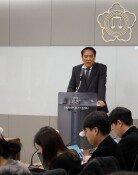Drinking tap water can save $1.75 billion of social costs, say experts
Drinking tap water can save $1.75 billion of social costs, say experts
Posted November. 18, 2015 10:26,
The biggest benefit of drinking tap water is its cost effectiveness. The quality and taste of tap water are not inferior to plastic bottled water or water dispensers and is far cheaper. Experts say that by drinking tap water can save more than 2 trillion won (1.75 billion U.S. dollars) of social costs a year.
Jeon Hyeong-joon, professor of Dankuk University`s conflict resolution center, released a report titled "A Study on Reexamining the Economic Value of Tap Water" last year. According to the report, a four-member household can save more than 20,000 won (17 dollars) a month by drinking tap water. The study assumed that a four-member household drinks 72 liters of water a month and compared with costs of spending on plastic bottled water and water purifier maintenance. Tap water rates are 32 won (3 cents) per 72 liters, while the same amount of bottled water costs 11,825 won (10.09 dollars), and water dispenser 21,881 won (18.66 dollars), a 683-fold increase. If people drink tap water at home instead of bottled water or water from water dispensers, they can annually save 140,000-260,000 won (119-222 dollars).
Drinking tap water also helps protect the environment. Production of bottled water and water dispensers requires up to 1,300 times more energy than tap water. According to the carbon dioxide score board released by the Environment Ministry last year, tap water had the lowest level of CO2 emissions. The score board shows the amount of carbon dioxide occurring in the process of production, distribution, use and disuse of a product, and is an indicator of how environment-friendly a product is.
A research team led by Jeon used this index to compare CO2 emissions from tap water, bottled water and water dispensers in terms of daily water intake recommendations set at 2 liters. The results showed that CO2 emissions from bottled water stood at 238-271 grams, and water dispenser at 171-677 grams. Tap water`s CO2 emissions were at just 0.51 grams. Drinking 2 liters of tap water on a daily basis for a year is equivalent to planting 51 pine trees.
Drinking tap water can also help reduce the environmental hazards of empty plastic bottles. Thrown away bottles are polluting soil and water globally. In Korea, two out of 10 bottles are either incinerated or buried in landfill. Only 80 percent are recycled to be used as raw materials for other goods. Plastic bottles are blamed as the main culprit of resource waste and environmental pollution as they cannot be reused like glass bottles.
"We are worried about depletion of underground water in the longer term," said Kim Dong-eon, eco-city team chief of the Korean Federation for Environmental Movement. "Given economic feasibility and environmental aspects, drinking tap water is a more value-oriented option."
whalefisher@donga.com







